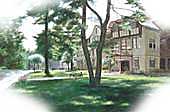Winter
1998
The
Divine Substitute
By John Wright Follette
"It is not for you to know the times or the seasons
which the Father has put in His own power. But you
shall receive power after that the Holy Spirit has
come upon you, and you shall be witnesses unto
Me." Acts 1:7-8a.
Within this Scripture is a principle which the Lord often
uses concerning our spiritual development.
This is the divine substitute, "It is not for you to
know ... but you shall receive power."
When it is not the Lord's will to answer prayer in the time
and way we think He should, His enabling grace (power) becomes
present as the substitute, to accomplish a higher purpose.
There are three basic questions that we generally ask at
some point in our Christian experience. We may wonder "when"
the Lord will respond to a particular problem; we may struggle
with "how" the Lord will resolve this problem; or
we may be concerned with "why" the Lord is not answering
as we feel He should.
Many of us, in some form, are involved in the following situation.
The Lord had revealed to us something He wished to accomplish.
Then before its full outworking, several adverse circumstances
hindered the answer. As a result, we are unable to relate
our present circumstances to the "word" we were
given. The illumination of our spirit, which came when the
Lord spoke, has fallen into total eclipse.
At this point we begin to ask, "When Lord, will You
do that which You promised?" This question was also asked
by the disciples who followed Jesus in His earthly ministry.
Jesus came teaching the Kingdom. He told His disciples from
whence this Kingdom came, its laws and principles, and how
it was to be entered. But each day, they expected Him to establish
a literal Kingdom of power and glory. Even after His resurrection,
these disciples still held to the idea of a material Kingdom.
Therefore, as Jesus was about to ascend into Heaven, they
again asked, "Lord, will You at this time restore the
Kingdom to Israel?"
The disciples heard Jesus say many things about this Kingdom.
Therefore, their question as to "when" was reasonable.
All was true that He said concerning a Kingdom, but the time
for its manifestation had not yet come. There was first to
be a spiritual conception and development of it in the heart,
a "millennium" established in the life of the individual.
Because the disciples were limited to their present, material
interpretation, Jesus could not unfold to them the fact that
there would be two thousand years of Church history before
there would be any outward manifestation of this Kingdom.
If they were to be told this, it would have thrown them into
confusion and doubt.
However, Jesus did not utterly disappoint them. He diverted
their attention from that which they could not enter, to what
they were to do. He gave them "the divine substitute."
This substitute for what they expected would be His power
manifesting within them. By yielding to this, they became
the dynamic factors in the establishing of His Church. It
was not for them to know "when," but they could
enter into a fruitful ministry under the power and grace of
God.
This divine substitute of His power and grace is for us today.
There may be things which must first be accomplished within
us, before the Lord will bring about the full manifestation
of His will.
When the seeming delay becomes so painful, the silence so
deep, the waiting hours so crowded with shadows; we are to
trust Him more fully and say, "Lord, Your time is best."
The second question, which has to do with the divine process,
is how? Often, we are willing to let the time element rest
in the Lord's hands, but the "how" bothers us. Again,
let us turn to the Scriptures and find one who asked this
question.
When Gabriel told Mary that she would give birth to the Messiah,
she asked, "How shall this be?" as she was not married.
This was a question born of surprise and did not savor of
doubt or unbelief.
Mary did not receive a satisfying answer. Instead, Gabriel
interested her in God's side of the question. "The Holy
Spirit will come upon you, and the power of the Highest will
overshadow you ... for with God nothing shall be impossible."
How wonderfully she responded. Without any further questioning,
she yielded herself in simple faith to the working of the
Lord. No longer is it, "how?" but "Behold,
the handmaid of the Lord, be it unto me according to Thy word."
We are often tempted to ask "How?" This is because
our expectations are from a human source. "I know the
Lord can do this, but "how" could He do it in these
circumstances?"
The Lord cannot always tell us how. If He were to reveal His
plans, we would no longer need to trust Him and would become
careless, or overwhelmed at the thought of the trials we would
face.
This limitation is not on His part, but like the disciples
of old; we are too limited in our spiritual development to
grasp the larger picture. Jesus had to say to His disciples,
"I have many things to say unto you, but you cannot bear
them now."
Often, we are not mature enough to hear the truth and rightly
incorporate it into our pattern of life. We are like the child
who was learning the months of the year and the days of the
week, but became confused and asked, "which comes first,
Tuesday or June?" It would be quite impossible to give
a simple answer.
We must not become impatient either with the Lord, or with
ourselves. There are many things we cannot receive in our
spiritual development merely by a word of explanation. These
can only be learned through experience, and this is a slow,
difficult process.
Therefore, when the Lord is unable to tell us "how,"
His grace will be present to bring us through.
The third question has to do with "why?" There
are times when we struggle with a situation that we do not
understand. It is not a matter of faith, as we are trusting,
but we wonder "why" as to the reason for the test.
Let us consider Paul and his "thorn" in the flesh.
The Lord had so mightily blessed Paul with heavenly visitations
and experiences that there was a danger of pride. Therefore,
the Lord moved to protect him from the loss of his reward
by placing a thorn (the Greek word is stake) in his flesh,
to hold him down.
"And lest I should be exalted above measure
through the abundance of the revelations,
there was given me a thorn in the flesh,
the messenger of Satan to buffet me, lest
I should be exalted above measure." II Cor 12:7.
This "stake" kept Paul where he belonged. It was
a messenger of Satan, a demon, who had access to Paul and
troubled him. Some think the thorn was ophthalmia, a eye disease;
but the argument for that is very weak.
In Greek, there are two words for flesh. One is "seres,"
which is restricted to the flesh of the body. The other word
is "sarx" which means the whole nature of man mental,
spiritual, and physical. Paul tells us that this "stake"
was in his sarx. It had power in every department of his nature.
We know this also from the summary that Paul made, after he
understood the purpose for this affliction,
"Therefore I take pleasure in infirmities, in
reproaches, in necessities, in persecutions,
in distresses for Christ's sake; for when I
am weak, then am I strong." II Cor 12:7.
When Paul recognized that he had this thorn, he sought the
Lord for its removal. Although he diligently prayed three
times, he did not receive his deliverance in the way he expected.
The Lord had a better and more glorious way of answering his
prayer.
For the Lord to free Paul from the power of this demon would
only endanger him to pride and failure. Therefore, He did
not answer the prayer in the way that Paul desired, but in
a much better way.
He gave Paul a divine substitute - grace and power - so Paul
could rise above this thorn. The Lord's method would build
character in Paul, and bring greater glory to His name.
We should never limit the Lord to doing as we think He should.
The Lord is wise in all His dealings. In His plan, there are
many things to be accomplished other than merely the answering
of a prayer, so as to make us more comfortable. If we listen,
we will hear Him say, "My grace is sufficient for thee."
The Lord has made me to know that I am not to pray about
certain things. We can press the Lord for answers, but how
much better to trust Him and rest, knowing that He will answer
in His time and way.
There are those who are determined to press through for the
answer. But these will find that they have suffered an eternal
loss. The Lord knows what He is doing, and we displease Him
when we do not trust and rest in Him, knowing that he will
abide faithful.
The divine substitute is ever present. His grace is free
and abundant. Let us lay these troublesome questions, "when"
"how" "why” at His feet, and there, in
simple faith and trust, worship Him.


